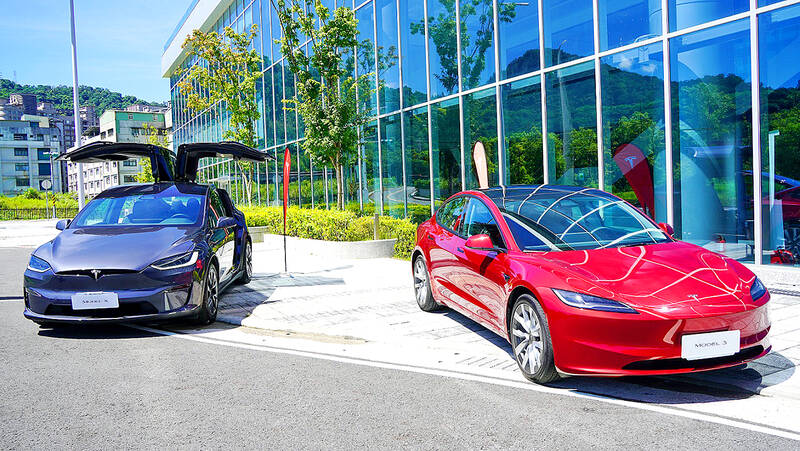New vehicle sales in Taiwan last month dropped 10.1 percent annually to 39,181 units, as demand cooled and new local content rules weighed on market sentiment, auto market researcher U-car said yesterday.
However, on a monthly basis, sales expanded 17.9 percent from October, data showed.
The local vehicle market turned sluggish this year after a massive order backlog was fulfilled last year as automakers overcame component shortages and stepped up production, U-car said, adding that the decline in sales accelerated in the second half of this year.

Photo courtesy of New Taipei City Economic Development Department
The new local content rules, which took effect in August, upended the auto market, with new MG electric vehicles (EVs) being barred from sales and new model introductions being rescheduled.
MG cars are developed by China’s MG Motor Corp and assembled by China Motor Corp (中華汽車) in Taiwan, with a majority of the auto parts imported from China.
During the first 11 months of this year, new vehicle sales contracted 4 percent annually to 416,528 units, U-car said.
Whether full-year sales would be able to grow for a second straight year remains to be seen, as car distributors usually launch promotions later in the year, it added.
Hotai Motor Co (和泰汽車), which dominates the local market with a 36.1 percent share, said it expects new vehicle sales this month to shrink 3 percent year-on-year to 42,000 units, bringing full-year sales to 460,000 units, down 1.3 percent from 466,000 units last year.
Hotai also trimmed its own annual sales by almost 6 percent to 160,000 units from an earlier estimate of 170,000 units, citing insufficient supply from Toyota Motor Corp.
Tesla Inc sold 13,364 units in the first 11 months of this year, maintaining its top position in the electric vehicle market, ahead of Luxgen Motor Co (納智捷汽車), a subsidiary of Yulon Motor Co (裕隆汽車), with 6,620 cars, data showed.
Separately, Sanyang Industrial Co (三陽工業) yesterday announced that it was withdrawing from the Taiwan Transportation Vehicle Manufacturers’ Association (台灣車輛工會).
The government’s sudden adjustments of local content rules and the association’s failure to inform and help members in time have left many unprepared to cope with the changes, a statement issued by Sanyang chairman Wu Ching-yuan (吳清源) said.

NEW IDENTITY: Known for its software, India has expanded into hardware, with its semiconductor industry growing from US$38bn in 2023 to US$45bn to US$50bn India on Saturday inaugurated its first semiconductor assembly and test facility, a milestone in the government’s push to reduce dependence on foreign chipmakers and stake a claim in a sector dominated by China. Indian Prime Minister Narendra Modi opened US firm Micron Technology Inc’s semiconductor assembly, test and packaging unit in his home state of Gujarat, hailing the “dawn of a new era” for India’s technology ambitions. “When young Indians look back in the future, they will see this decade as the turning point in our tech future,” Modi told the event, which was broadcast on his YouTube channel. The plant would convert

‘SEISMIC SHIFT’: The researcher forecast there would be about 1.1 billion mobile shipments this year, down from 1.26 billion the prior year and erasing years of gains The global smartphone market is expected to contract 12.9 percent this year due to the unprecedented memorychip shortage, marking “a crisis like no other,” researcher International Data Corp (IDC) said. The new forecast, a dramatic revision down from earlier estimates, gives the latest accounting of the ongoing memory crunch that is affecting every corner of the electronics industry. The demand for advanced memory to power artificial intelligence (AI) tasks has drained global supply until well into next year and jeopardizes the business model of many smartphone makers. IDC forecast about 1.1 billion mobile shipments this year, down from 1.26 billion the prior

People stand in a Pokemon store in Tokyo on Thursday. One of the world highest-grossing franchises is celebrated its 30th anniversary yesterday.

Zimbabwe’s ban on raw lithium exports is forcing Chinese miners to rethink their strategy, speeding up plans to process the metal locally instead of shipping it to China’s vast rechargeable battery industry. The country is Africa’s largest lithium producer and has one of the world’s largest reserves, according to the US Geological Survey (USGS). Zimbabwe already banned the export of lithium ore in 2022 and last year announced it would halt exports of lithium concentrates from January next year. However, on Wednesday it imposed the ban with immediate effect, leaving unclear what the lithium mining sector would do in the